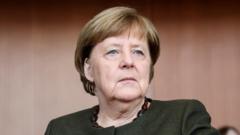Elon Musk's upcoming live interview with Alice Weidel, the leader of the Alternative for Germany (AfD), signals a potential shift in the political landscape as he aims to break the long-standing political blockade against the party.
Elon Musk's Controversial Move: Spotlight on Germany's Far-Right AfD

Elon Musk's Controversial Move: Spotlight on Germany's Far-Right AfD
Elon Musk is leveraging his platform X to legitimize Germany's far-right party, the AfD, amid political outrage.
In a bold move that has garnered both attention and concern, Elon Musk is set to host a live interview on his social media platform X with Alice Weidel, the chancellor candidate for the Alternative for Germany (AfD). The interview, scheduled for Thursday, comes as Germany prepares for a snap election on February 23, where the AfD is reported to be gaining significant traction with voters, now polling as the second most popular party in the nation.
This intervention by Musk, who is not shy about involving himself in various political discussions, has raised alarms within Germany's political establishment, which has long shunned the far-right party due to its controversial stance on immigration and a history that echoes the country's dark past. Musk’s support provides the AfD with a public platform that they have traditionally been denied, which could tilt the scales in the upcoming elections.
With around 20% of the electorate backing the AfD, their anti-establishment message has resonated with a portion of the population, particularly those discontented with the previous government’s migration policies. Weidel, who is the AfD’s leader, has positioned herself as a chancellor candidate despite facing challenges in obtaining media coverage compared to other candidates.
This development highlights a struggle in Germany’s political fabric, exposing the widening discourse surrounding immigration and the acceptance of far-right ideologies. While other European countries have seen similar populist parties rise to power, Germany navigates a unique landscape complicated by its history. With Musk's interview, the AfD might gain the visibility it has sought, raising questions about the implications for Germany’s future political climate.
This intervention by Musk, who is not shy about involving himself in various political discussions, has raised alarms within Germany's political establishment, which has long shunned the far-right party due to its controversial stance on immigration and a history that echoes the country's dark past. Musk’s support provides the AfD with a public platform that they have traditionally been denied, which could tilt the scales in the upcoming elections.
With around 20% of the electorate backing the AfD, their anti-establishment message has resonated with a portion of the population, particularly those discontented with the previous government’s migration policies. Weidel, who is the AfD’s leader, has positioned herself as a chancellor candidate despite facing challenges in obtaining media coverage compared to other candidates.
This development highlights a struggle in Germany’s political fabric, exposing the widening discourse surrounding immigration and the acceptance of far-right ideologies. While other European countries have seen similar populist parties rise to power, Germany navigates a unique landscape complicated by its history. With Musk's interview, the AfD might gain the visibility it has sought, raising questions about the implications for Germany’s future political climate.






















